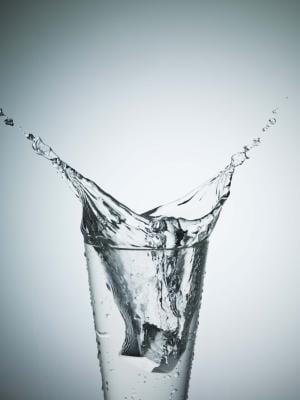Water makes up more than half of the human body. Since people constantly lose water from urination, sweat and other bodily functions, you need a constant supply to stay healthy. While the National Institute of Medicine have daily water recommendations for adult men and women, they do not offer any for children. Teach your child to drink whenever he feels thirsty and he should get plenty of water each day.
Significance of Water
Every cell in the body contains water. A child needs water for his blood to flow properly, for his immune system to function as it should and fight disease, and so that his body can get rid of waste through the digestive system. He also needs water to sweat, which cools his body when it becomes hot. Water provides an added benefit if it contains fluoride, as many tap waters do. Fluoride helps protect the enamel on a child’s teeth.
Water Sources
Your child doesn’t have to drink glass after glass of tap or spring water to get what she needs to stay hydrated each day. Water is found in any liquid, so even if your child drinks a glass of milk with dinner instead of plain water, you shouldn’t worry about dehydration. Fruits and vegetables are also great sources of water. Try to avoid giving your child a soda pop or fruit drinks in place of water. The caffeine in soda has a diuretic effect, so your child will lose more liquid than she gains. Sugar in fruit drinks and juices provides extra calories, making it less beneficial than water.
When to Drink
Give your child an 8 oz. glass of water or milk to drink with every meal. Tell him to drink whenever he feels thirsty. Make water easy to access in your house, either by placing a child-safe pitcher of water in the refrigerator or by investing in individual water bottles. Children in the United States should be able to access water whenever they feel thirsty during the school day, for free, per the Center for Disease Control and Prevention’s “Nutrition Standards for Foods in Schools” brochure. Children should drink a glass of water before playing sports, while they play and directly afterward to stay hydrated. They also need to drink extra water when sick, such as when they have diarrhea, to prevent dehydration.
Risks
Too little water can cause health problems stemming from dehydration. Recognize the signs of dehydration so that you can take action and give your child water as needed. Dehydration may make her dizzy or lightheaded, according to Kids Health. You may notice her lips are dry and looked chapped. Too much water can also cause health problem , as the body flushes too much sodium from the blood. Don’t let your child participate in water-chugging contests, and make sure she doesn’t guzzle too much, such as an entire liter bottle, after playing sports.
Convincing Your Child to Drink Water
While it’s one of the building blocks of life, water doesn’t taste very exciting, especially compared to the extremely sweet sodas and juices available. You can make water more enticing for children by adding a slices of fruit, such as lemon or strawberries, to a pitcher or glass. If your child loves soda, try giving him flavored sparkling or seltzer water. Set a good example and drink water yourself.





